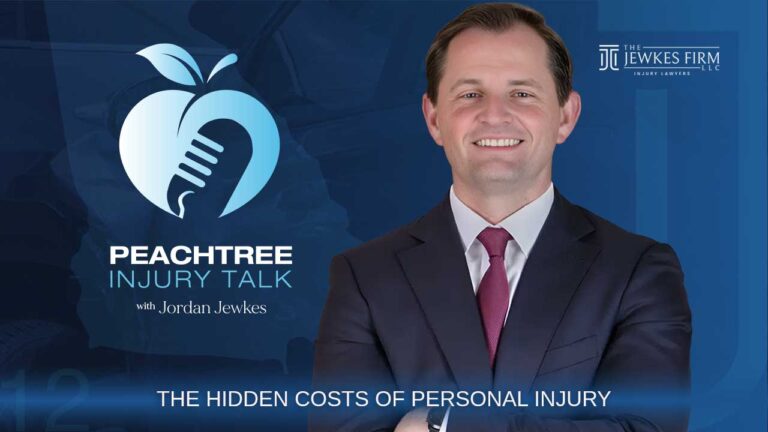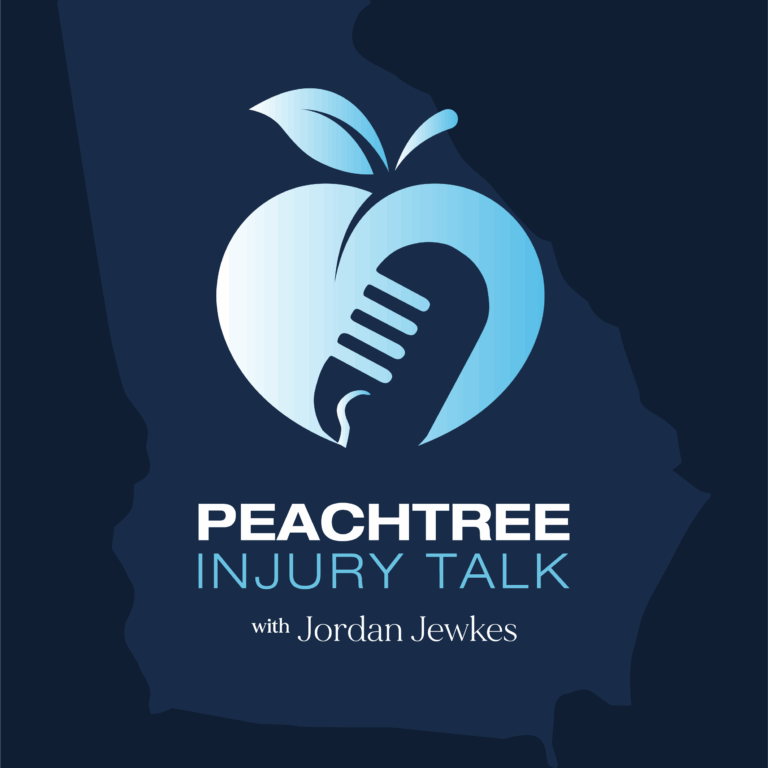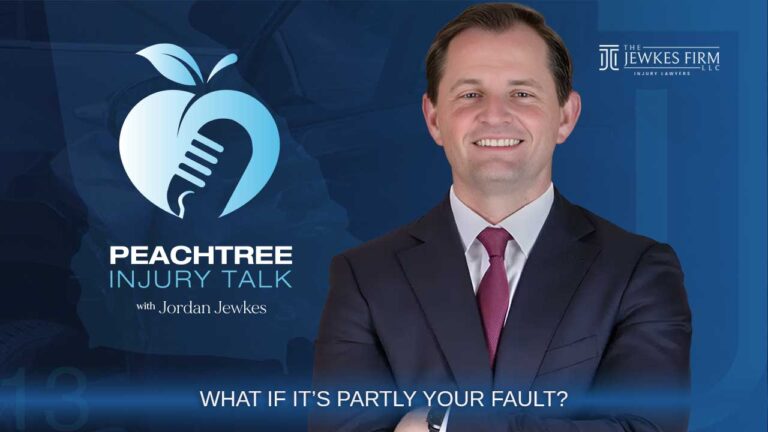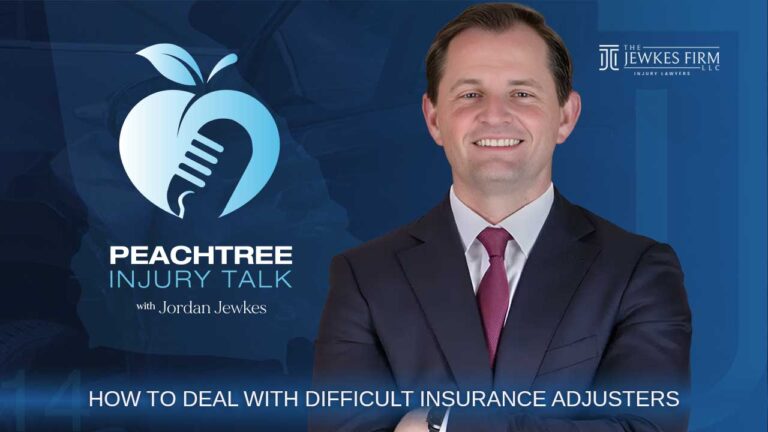| 00:00 |
Narrator: Welcome to Peachtree Injury Talk with attorney Jordan Jewkes.
|
| 00:05 |
Jon Clemence: Welcome to Peachtree Injury Talk with attorney Jordan Jewkes. Jordan strives to give injured victims a voice and provide strong advocacy against an often broken system. My name is Jon Clemence, and today’s episode is When the Other Driver Lies: Navigating Disputed Liability Claims.
So first of all, Jordan—welcome back to the show.
|
| 00:25 |
Jordan Jewkes: Hey, thanks, John. I always love coming on here, and I appreciate you having me.
|
| 00:33 |
Jon Clemence: Absolutely. I’m excited to get into the questions, so let’s start. What happens when the at-fault driver gives a completely different version of the accident than what someone else says?
|
| 00:41 |
Jordan Jewkes: That’s a great place to start. Unfortunately, it’s a common occurrence. The at-fault driver might admit something at the scene—maybe say, “I’m sorry, I wasn’t paying attention”—but then when the police arrive, they suddenly claim, “I had the green light,” or, “It wasn’t my fault.” They make up a story that doesn't reflect reality.
That can throw a wrench in things. It may confuse the officer, result in an unclear report, and generally make the claim process tougher. People sometimes lie or twist the facts to avoid responsibility or protect their insurance rates.
|
| 01:39 |
Jon Clemence: Is it always a straight-up lie? Or could it just be telling things in a way that makes them look a little better?
|
| 01:47 |
Jordan Jewkes: Sure. And there’s actually a lot of research on this. There’s even a famous Japanese film—Rashomon—that explores how multiple people can witness the same event and report totally different versions.
It’s not always malicious. People may genuinely remember things differently. But often, the person who caused the wreck will “reframe” what happened in a way that diminishes their own fault. Maybe they convince themselves the light was yellow when it was actually red. It’s part psychology, part self-preservation.
|
| 03:05 |
Jon Clemence: Right—and that’s maybe different than a true disputed liability case. In those cases, how do you handle it?
|
| 03:14 |
Jordan Jewkes: If there's a genuine dispute, we go beyond the drivers’ statements. We look for witnesses, business surveillance video, dash cams—even in-vehicle systems like Tesla’s cameras.
Sometimes it's just a close call, like two cars entering an intersection as the light changes. You’ve got to rely on external sources to uncover the truth—people who saw the wreck or video footage that captured it.
|
| 04:28 |
Jon Clemence: And how do you go about collecting that kind of evidence? Can a person do that on their own, or do they need to work with you?
|
| 04:37 |
Jordan Jewkes: Anyone can do it, but it’s hard—especially if you’re injured and waiting for an ambulance. You’re not in a position to chase down witnesses or survey nearby cameras.
That’s why the sooner you contact an attorney, the better. We send investigators to talk to local businesses, ask about surveillance, and request footage. In one case, our client was hit in an intersection. The other driver claimed they had the green light. We immediately sent someone to canvass the area, found businesses with exterior cameras, and got real footage that supported our client's story. It was invaluable.
|
| 05:56 |
Jon Clemence: So timing matters. These recordings can get erased, right?
|
| 06:15 |
Jordan Jewkes: Absolutely. Every day that goes by, it becomes less likely that footage will be preserved. Some systems loop over their recordings in five days. Older systems used to overwrite within 30 days. Nowadays, many record to the cloud and last longer—but not always.
So we move quickly: we confirm whether there’s footage, get a preservation agreement in writing, and follow up. You never know if a camera is even working or actually recording. Some are just live feeds with no storage.
|
| 08:56 |
Jon Clemence: Have you ever had to go to a big company—like Ring—to request doorbell footage?
|
| 09:07 |
Jordan Jewkes: We’ve tried. Ring and similar systems are everywhere now, and we do see them in neighborhood wrecks. Sometimes a car backs out of a driveway and gets hit, or vice versa, and doorbell cameras catch the whole thing.
We’ll go door to door if needed, especially if we know the wreck happened near a residential street. You’d be surprised how often we find helpful footage—sometimes even showing the other driver clearly at fault.
|
| 10:04 |
Jon Clemence: Or in my neighborhood, you might just catch the coyotes and bears on camera.
|
| 10:21 |
Jordan Jewkes: Exactly! But seriously, those cameras are installed for safety—but they’ve become valuable for accident cases too. We've used plenty of them in disputed liability claims.
|
| 10:33 |
Jon Clemence: So shifting gears—what do you do when you're representing a client and the facts are contested? What tools do you use?
|
| 10:45 |
Jordan Jewkes: The first thing we do is take thorough notes and have the client write down their version while it's fresh.
We also assume that anything said to the insurance company is recorded. So even before we get involved, the other side may have already started collecting evidence—recorded statements, witness interviews, even police conversations. That’s why hiring an attorney early is key.
Also, most officers today have body cams. If someone says one thing at the scene and another during a deposition, we can compare the two. That discrepancy can be critical.
|
| 13:15 |
Jon Clemence: So really, it’s about facts—facts win cases.
|
| 13:20 |
Jordan Jewkes: Exactly. Sometimes our client’s recollection doesn’t match the actual evidence. Maybe they truly believe they had a green light—but video shows they didn’t. If that’s the case, we’ll be honest with them.
You can’t make facts up and expect to win. Juries want to see the truth. So yes, it always comes down to the facts.
|
| 14:44 |
Jon Clemence: What if you just get that gut feeling the other driver is shady? What should someone do at the scene?
|
| 14:48 |
Jordan Jewkes: Great question. First, don’t apologize—it can be twisted into an admission of guilt.
Second, document everything. Use your phone. Take photos of the damage, the street, any skid marks, the intersection—anything you can safely capture.
If you think the other driver might lie, discreetly start recording audio or video. Put your phone in your pocket, hit record, and let it roll. And remember, the police officer is the one you need to give a full and honest explanation to—not the other driver.
|
| 17:05 |
Jon Clemence: Right. And of course, if you’re seriously injured, all of that may not be possible in the moment.
|
| 17:11 |
Jordan Jewkes: Exactly. If you're being taken away in an ambulance, obviously you can’t play detective. But maybe a friend or family member can get to the scene and help gather evidence. The more you can do, the better—but your health always comes first.
|
| 17:36 |
Jon Clemence: One last quick question—have you ever had a case where a lie was exposed in court? What happened?
|
| 17:45 |
Jordan Jewkes: Oh yeah, and we kind of live for those moments as trial lawyers. One that comes to mind: we had a head-on collision, and each driver claimed the other crossed the center line.
We did some digging and found old Facebook posts from the other driver that were inconsistent with what he told police and what he testified to later. It helped us impeach his credibility and ultimately win the case. That’s why social media investigations are part of our process.
|
| 19:36 |
Jon Clemence: Facebook’ll get you every time.
|
| 19:39 |
Jordan Jewkes: No doubt. People forget how public that stuff is. And it can absolutely come back to bite them in court.
|
| 19:42 |
Jon Clemence: Well, Jordan, time flew by. I can’t believe we’re already out of time. Thanks so much for joining us today—I’m looking forward to the next conversation.
|
| 19:51 |
Jordan Jewkes: You too, John. Always enjoy it.
|
| 19:53 |
Jon Clemence: And to our listeners, thank you for joining us on Peachtree Injury Talk with Jordan Jewkes. To connect with Jordan and his team, visit jewkesfirm.com (https://jewkesfirm.com).jewkesfirm.com. Be sure to like, subscribe, and leave a review. Until next time, have a great day.
|
| 20:08 |
Narrator: Thanks for watching. Be sure to hit that like and subscribe button and leave us a review in the comments.
|





